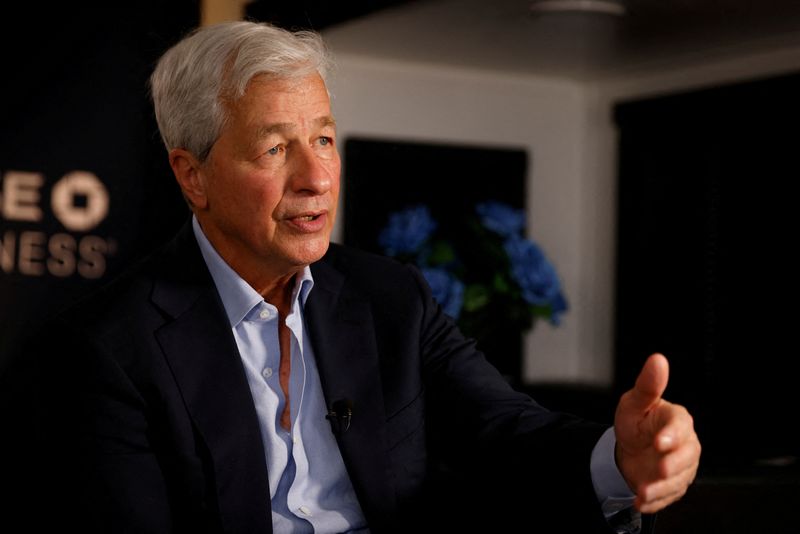By Tatiana Bautzer
NEW YORK (Reuters) -The U.S. banking crisis is ongoing and its impact will be felt for years, JPMorgan Chase & Co (NYSE:JPM) CEO Jamie Dimon wrote in a letter to shareholders on Tuesday.
"The current crisis is not yet over, and even when it is behind us, there will be repercussions from it for years to come," Dimon wrote in a 43-page annual message covering a range of topics from JPMorgan's performance to geopolitics and regulation.
Storm clouds are still threatening the economy as they did a year ago, said Dimon, chief executive of the largest U.S. lender. And the banking system is under renewed stress after the failure of Silicon Valley Bank and Credit Suisse's rescue by UBS last month.
"The market's odds of a recession have increased," Dimon wrote. "And while this is nothing like 2008, it is not clear when this current crisis will end. It has provoked lots of jitters in the market and will clearly cause some tightening of financial conditions as banks and other lenders become more conservative."
Even so, it is unclear whether the disruptions will slow the consumer spending that drives the U.S. economy, Dimon wrote.
Risks that led to the current crisis were "hiding in plain sight," Dimon wrote, citing the interest rate exposure and level of uninsured deposits at Silicon Valley Bank.
But he downplayed similarities to the global financial crisis. While the 2008 crash hit large banks, mortgage lenders and insurers with global interconnections, "this current banking crisis involves far fewer financial players and fewer issues that need to be resolved," Dimon said.
After taking the helm of JPMorgan in 2006, Dimon presided over the bank's crisis-era acquisitions of troubled investment bank Bear Stearns and Washington Mutual, the savings and loan whose failure was the largest in U.S. history.
As the current crisis unfolded, Dimon again played a central role, helping to arrange a $30 billion lifeline for First Republic Bank (NYSE:FRC) from 11 large lenders.
JPMorgan, Bank of America Corp (NYSE:BAC), Citigroup (NYSE:C) and Wells Fargo (NYSE:WFC) & Co committed $5 billion each, followed by Morgan Stanley (NYSE:MS) and Goldman Sachs (NYSE:GS), with $2.5 billion apiece.
Any new regulations in response to the latest turmoil should be "thoughtful," including clearer rules for dealing with failed banks, Dimon wrote. "Erratic stress test capital requirements and constant uncertainty around future regulations damage the banking system without making it safer."
JPMorgan's shares have fallen almost 3% this year as of the stock's previous close, in contrast with a 13% decline in the S&P index of broader bank stocks.
Shares in the bank fell 2% to $127.55 shortly after midday.
The company, alongside other lending giants Bank of America and Citigroup, were flooded with deposits after the collapse of Silicon Valley Bank in March, sources familiar with the situation said at the time.

Dimon also took aim at nonbank financial firms, which have become increasingly competitive with banks in providing mortgages, credit cards and market-making services.
"Would nonbank credit-providing institutions be able to provide credit when their clients need them the most?" he asked. "I personally doubt that many of them could."